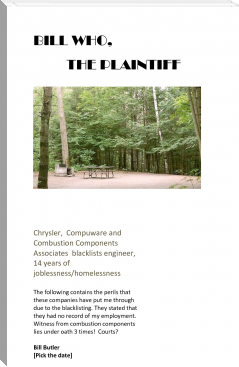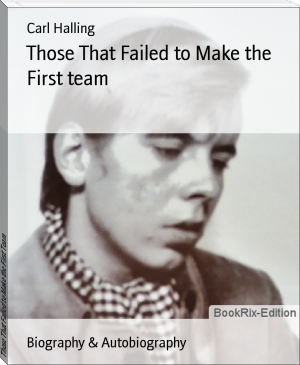The Story of Cole Younger, by Himself - Cole Younger (good novels to read in english .TXT) 📗

- Author: Cole Younger
Book online «The Story of Cole Younger, by Himself - Cole Younger (good novels to read in english .TXT) 📗». Author Cole Younger
the last battle in Johnson county in May, 1865.
The spectre of Paola now rose to haunt me. Although all the guerrillas knew who had killed young Judy, his father had secured my indictment in Kansas on the charge of murdering his son. Judy, who had returned to Missouri as the appointed sheriff of Cass county, had a posse prepared to serve a writ for me in its usual way—a night visit and then the pistol or the rope.
I consulted with old ex-Governor King at Richmond, who had two sons in the Federal army, one of whom I had captured during the war, although he did not know it at the time, and with Judge Tutt of this district.
Judge Tutt said there was no sheriff in this vicinity who would draw a jury that would give me a fair trial. If I should so make oath he, as judge, would appoint a jury commissioner who would summon a jury that would give me a fair trial, but he was confident that as soon as he did so mob law would be invoked before I could go to trial.
One man had been taken from the train and hung at Warrensburg and there had been many like offenses against former Confederate soldiers.
Judy had no legal rights in Jackson county, but in spite of that his posse started for the Younger farm one night to take me. George Belcher, a Union soldier, but not in sympathy with mob law, heard of Judy’s plans, and through Sam Colwell and Zach Cooper, neighbors, I was warned in the evening of the intended raid. When they came I was well out of reach on my way to the home of my great-uncle, Thomas Fristoe, in Howard county.
Judy and his mob searched the house in vain, but they put up for a midnight supper which they compelled the faithful “Aunt Suse” to provide, and left disappointed.
Judy and his Kansas indictment were the entering wedge in a wasted life. But for him and his mob law Mr. and Mrs. Cole Younger, for there was a dear sweetheart awaiting my return, might have been happy and prosperous residents of Jackson county from 1866 to this day.
It was while I was visiting my great-uncle in Howard county that there took place at Liberty the first of a long string of bank and train robberies, all of which were usually attributed either to the Younger brothers, or to some of their friends, and which we were unable to come out and successfully refute for two reasons, first the bringing down of a storm about the heads of those who had sheltered us; and second, giving such pursuers as Judy and his posse fresh clues to our whereabouts.
18. NOT ALL BLACK
From the mass of rubbish that has been written about the guerrilla there is little surprise that the popular conception of him should be a fiendish, bloodthirsty wretch.
Yet he was, in many cases, if not in most, a man who had been born to better things, and who was made what he was by such outrages as Osceola, Palmyra, and a hundred other raids less famous, but not less infamous, that were made by Kansans into Missouri during the war.
When the war ceased those of the guerrillas who were not hung or shot, or pursued by posses till they found the hand of man turned against them at every step, settled down to become good citizens in the peaceful walks of life, and the survivors of Quantrell’s band may be pardoned, in view of the black paint that has been devoted to them, in calling attention to the fact that of the members of Quantrell’s command who have since been entrusted with public place not one has ever betrayed his trust.
John C. Hope was for two terms sheriff of Jackson county, Mo., in which is Kansas City, and Capt. J. M. Tucker was sheriff at Los Angeles, California. Henry Porter represented one of the Jackson county districts in the state legislature, removed to Texas, where he was made judge of the county court, and is now, I understand, a judge of probate in the state of Washington. “Pink” Gibson was for several years county judge in Johnson county; Harry Ogden served the state of Louisiana as lieutenant-governor and as one of its congressmen. Capt. J. G. Lea was for many years instructor in the military department of the University of New Mexico, and, I believe, is there yet. Jesse Hamblett was marshal at Lexington, and W. H. Gregg, who was Quantrell’s first lieutenant, has been thought well enough of to be a deputy sheriff under the administration of a Republican. Jim Hendricks, deputy sheriff of Lewis and Clark county, Montana, is another, but to enumerate all the men of the old band who have held minor places would be wearisome.
19. A DUEL AND AN AUCTION
I left Missouri soon after Judy’s raid for Louisiana, spending three months with Capt. J. C. Lea on what was known as the Widow Amos’ farm on Fortune fork, Tensas parish. We then rented the Bass farm on Lake Providence, in Carroll parish, where I stayed until 1867, when chills and fever drove me north to Missouri. When the bank at Russellville, Ky., was robbed, which has been laid to us, I was with my uncle, Jeff Younger, in St. Clair county, and Jim and Bob were at home here in Lee’s Summit.
At the time of the Richmond and Savannah, Mo., bank robberies, in which, according to newspapers and sensationalists, I was largely concerned, I was living on the Bass plantation, three miles below Lake Providence, in Louisiana. Capt. J. C. and Frank Lea, of Roswell, N. M., and Tom Lea, of Independence, Mo., were living in the same house with me, any one of whom will vouch for the truth of my statement that I was not anywhere near either of these towns at the time of the robberies in question, but was with them at the plantation referred to above. Furthermore, right here I want to state, and I will take my oath solemnly that what I say is the truth, and _nothing but the truth, notwithstanding all the accusations that have been made against me, I never, in all my life, had anything whatever to do with robbing any bank in the state of Missouri_. I could prove that I was not in the towns where banks were robbed in Missouri, at the time that the raids took place, and in many instances that I was thousands of miles away.
In the fall of 1868 Jim and Bob went with me to Texas. Mother’s health had failed perceptibly, the result in a large measure of her exposure at the time the militia forced her to burn her house, and we sought to make her a home in a milder climate in the southwest. The next two or three years we spent there gathering and driving cattle, my sister joining us and keeping house for us at Syene, Dallas county, where we made our headquarters.
I was at Austin, Texas, when the Gallatin, Mo., bank was robbed; another crime of which we have been accused by the romancers, though never, so far as I know, by the authorities.
In 1870 and 1871 Jim was deputy sheriff of Dallas county.
Jim and Bob sang in the church choir there until 1872, when Bob, who was only seventeen, and in love with one of the local belles, felt keenly the obloquy attaching to the accusation that his brother Cole had robbed the Kansas City fair, and left Dallas.
One of the lies that had been published broadcast concerning me is that I killed five men and shot five others in a row over a “jobbed” horse race in Louisiana. There is this much truth about it—there was a jobbed race, and after it I fought a duel, but not over the race.
In the crowd that was present at the race was one Capt. Jim White, to whom I had sent word during the war that when I met him again he would have to apologize or fight because of circulating some scandal about a young woman friend of mine.
White introduced himself to me after this race, where a friend of mine had been swindled out of considerable money, and we went over to a neighboring plantation to shoot it out. At the first fire his right arm was shattered at the shoulder. He thought he was fatally hurt, and so did I at first, and he called me over and said: “Captain Younger, whether I die or not, I want to shake hands with you as a friend. I have had some differences of this sort with others and came out all right; people have sneered at my success and said, ‘Wait till Cap’n Younger gets at you. He’ll fix you!’ So I finally made up my mind to fight you, right or wrong.”
I told my friend who owned the plantation to take care of White, and I went to Texas to make in the cattle business some of the money I had lost trying to raise cotton. The next year I was over in Mississippi at a dance, and a young lady asked to be introduced to me.
Her name was White, and we had not talked long before she said:
“Mother says you’ve made a man of father.”
Captain White had crossed the river, quit his drinking associates, but I have never seen him since the day we shot it out.
This duel gave Cole Younger a reputation in that section which was of value to a poor preacher’s widow near Bayou Macon some time later.
There was to be a sale of the property and effects of the Widow Hurley. I attended the sale, hitched my horse in the barn lot and was walking across the garden at the back of the house toward an open space, where the crowd was gathered waiting for the auctioneer to open the sale. As I walked I came upon Mrs. Hurley, crying. “Good morning, Mrs. Hurley,” I said, “I am sorry to see you in tears; what is the trouble?”
She explained that her husband had mortgaged the property and stock before his death and she had not been able to lift it, and they were about to be taken away from her. I asked her what the amount of the indebtedness was, and she told me $80. I took the money out of my pocket and gave it to her, and told her to bid it in when the time came, and I gave her the signal.
Asbury Humphreys, who was the auctioneer, knew me from the story of the duel, and before he began I told him he would have to put the property all up at once.
Some of the fellows from over on the river wanted the cows and hogs put up separately, so they could pick out what they wanted, and Asbury declared he was afraid to change the plan for the sale. They would not let him live there if he did.
“Well, Asbury,” I said, “I’m going to be down beside the wagon where I can see you and you can see me, and when I give you the sign you knock the property down or I’ll have use for this pistol.”
I had not had time to coach Mrs. Hurley, so she made it somewhat
The spectre of Paola now rose to haunt me. Although all the guerrillas knew who had killed young Judy, his father had secured my indictment in Kansas on the charge of murdering his son. Judy, who had returned to Missouri as the appointed sheriff of Cass county, had a posse prepared to serve a writ for me in its usual way—a night visit and then the pistol or the rope.
I consulted with old ex-Governor King at Richmond, who had two sons in the Federal army, one of whom I had captured during the war, although he did not know it at the time, and with Judge Tutt of this district.
Judge Tutt said there was no sheriff in this vicinity who would draw a jury that would give me a fair trial. If I should so make oath he, as judge, would appoint a jury commissioner who would summon a jury that would give me a fair trial, but he was confident that as soon as he did so mob law would be invoked before I could go to trial.
One man had been taken from the train and hung at Warrensburg and there had been many like offenses against former Confederate soldiers.
Judy had no legal rights in Jackson county, but in spite of that his posse started for the Younger farm one night to take me. George Belcher, a Union soldier, but not in sympathy with mob law, heard of Judy’s plans, and through Sam Colwell and Zach Cooper, neighbors, I was warned in the evening of the intended raid. When they came I was well out of reach on my way to the home of my great-uncle, Thomas Fristoe, in Howard county.
Judy and his mob searched the house in vain, but they put up for a midnight supper which they compelled the faithful “Aunt Suse” to provide, and left disappointed.
Judy and his Kansas indictment were the entering wedge in a wasted life. But for him and his mob law Mr. and Mrs. Cole Younger, for there was a dear sweetheart awaiting my return, might have been happy and prosperous residents of Jackson county from 1866 to this day.
It was while I was visiting my great-uncle in Howard county that there took place at Liberty the first of a long string of bank and train robberies, all of which were usually attributed either to the Younger brothers, or to some of their friends, and which we were unable to come out and successfully refute for two reasons, first the bringing down of a storm about the heads of those who had sheltered us; and second, giving such pursuers as Judy and his posse fresh clues to our whereabouts.
18. NOT ALL BLACK
From the mass of rubbish that has been written about the guerrilla there is little surprise that the popular conception of him should be a fiendish, bloodthirsty wretch.
Yet he was, in many cases, if not in most, a man who had been born to better things, and who was made what he was by such outrages as Osceola, Palmyra, and a hundred other raids less famous, but not less infamous, that were made by Kansans into Missouri during the war.
When the war ceased those of the guerrillas who were not hung or shot, or pursued by posses till they found the hand of man turned against them at every step, settled down to become good citizens in the peaceful walks of life, and the survivors of Quantrell’s band may be pardoned, in view of the black paint that has been devoted to them, in calling attention to the fact that of the members of Quantrell’s command who have since been entrusted with public place not one has ever betrayed his trust.
John C. Hope was for two terms sheriff of Jackson county, Mo., in which is Kansas City, and Capt. J. M. Tucker was sheriff at Los Angeles, California. Henry Porter represented one of the Jackson county districts in the state legislature, removed to Texas, where he was made judge of the county court, and is now, I understand, a judge of probate in the state of Washington. “Pink” Gibson was for several years county judge in Johnson county; Harry Ogden served the state of Louisiana as lieutenant-governor and as one of its congressmen. Capt. J. G. Lea was for many years instructor in the military department of the University of New Mexico, and, I believe, is there yet. Jesse Hamblett was marshal at Lexington, and W. H. Gregg, who was Quantrell’s first lieutenant, has been thought well enough of to be a deputy sheriff under the administration of a Republican. Jim Hendricks, deputy sheriff of Lewis and Clark county, Montana, is another, but to enumerate all the men of the old band who have held minor places would be wearisome.
19. A DUEL AND AN AUCTION
I left Missouri soon after Judy’s raid for Louisiana, spending three months with Capt. J. C. Lea on what was known as the Widow Amos’ farm on Fortune fork, Tensas parish. We then rented the Bass farm on Lake Providence, in Carroll parish, where I stayed until 1867, when chills and fever drove me north to Missouri. When the bank at Russellville, Ky., was robbed, which has been laid to us, I was with my uncle, Jeff Younger, in St. Clair county, and Jim and Bob were at home here in Lee’s Summit.
At the time of the Richmond and Savannah, Mo., bank robberies, in which, according to newspapers and sensationalists, I was largely concerned, I was living on the Bass plantation, three miles below Lake Providence, in Louisiana. Capt. J. C. and Frank Lea, of Roswell, N. M., and Tom Lea, of Independence, Mo., were living in the same house with me, any one of whom will vouch for the truth of my statement that I was not anywhere near either of these towns at the time of the robberies in question, but was with them at the plantation referred to above. Furthermore, right here I want to state, and I will take my oath solemnly that what I say is the truth, and _nothing but the truth, notwithstanding all the accusations that have been made against me, I never, in all my life, had anything whatever to do with robbing any bank in the state of Missouri_. I could prove that I was not in the towns where banks were robbed in Missouri, at the time that the raids took place, and in many instances that I was thousands of miles away.
In the fall of 1868 Jim and Bob went with me to Texas. Mother’s health had failed perceptibly, the result in a large measure of her exposure at the time the militia forced her to burn her house, and we sought to make her a home in a milder climate in the southwest. The next two or three years we spent there gathering and driving cattle, my sister joining us and keeping house for us at Syene, Dallas county, where we made our headquarters.
I was at Austin, Texas, when the Gallatin, Mo., bank was robbed; another crime of which we have been accused by the romancers, though never, so far as I know, by the authorities.
In 1870 and 1871 Jim was deputy sheriff of Dallas county.
Jim and Bob sang in the church choir there until 1872, when Bob, who was only seventeen, and in love with one of the local belles, felt keenly the obloquy attaching to the accusation that his brother Cole had robbed the Kansas City fair, and left Dallas.
One of the lies that had been published broadcast concerning me is that I killed five men and shot five others in a row over a “jobbed” horse race in Louisiana. There is this much truth about it—there was a jobbed race, and after it I fought a duel, but not over the race.
In the crowd that was present at the race was one Capt. Jim White, to whom I had sent word during the war that when I met him again he would have to apologize or fight because of circulating some scandal about a young woman friend of mine.
White introduced himself to me after this race, where a friend of mine had been swindled out of considerable money, and we went over to a neighboring plantation to shoot it out. At the first fire his right arm was shattered at the shoulder. He thought he was fatally hurt, and so did I at first, and he called me over and said: “Captain Younger, whether I die or not, I want to shake hands with you as a friend. I have had some differences of this sort with others and came out all right; people have sneered at my success and said, ‘Wait till Cap’n Younger gets at you. He’ll fix you!’ So I finally made up my mind to fight you, right or wrong.”
I told my friend who owned the plantation to take care of White, and I went to Texas to make in the cattle business some of the money I had lost trying to raise cotton. The next year I was over in Mississippi at a dance, and a young lady asked to be introduced to me.
Her name was White, and we had not talked long before she said:
“Mother says you’ve made a man of father.”
Captain White had crossed the river, quit his drinking associates, but I have never seen him since the day we shot it out.
This duel gave Cole Younger a reputation in that section which was of value to a poor preacher’s widow near Bayou Macon some time later.
There was to be a sale of the property and effects of the Widow Hurley. I attended the sale, hitched my horse in the barn lot and was walking across the garden at the back of the house toward an open space, where the crowd was gathered waiting for the auctioneer to open the sale. As I walked I came upon Mrs. Hurley, crying. “Good morning, Mrs. Hurley,” I said, “I am sorry to see you in tears; what is the trouble?”
She explained that her husband had mortgaged the property and stock before his death and she had not been able to lift it, and they were about to be taken away from her. I asked her what the amount of the indebtedness was, and she told me $80. I took the money out of my pocket and gave it to her, and told her to bid it in when the time came, and I gave her the signal.
Asbury Humphreys, who was the auctioneer, knew me from the story of the duel, and before he began I told him he would have to put the property all up at once.
Some of the fellows from over on the river wanted the cows and hogs put up separately, so they could pick out what they wanted, and Asbury declared he was afraid to change the plan for the sale. They would not let him live there if he did.
“Well, Asbury,” I said, “I’m going to be down beside the wagon where I can see you and you can see me, and when I give you the sign you knock the property down or I’ll have use for this pistol.”
I had not had time to coach Mrs. Hurley, so she made it somewhat
Free e-book «The Story of Cole Younger, by Himself - Cole Younger (good novels to read in english .TXT) 📗» - read online now
Similar e-books:





Comments (0)